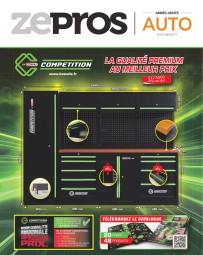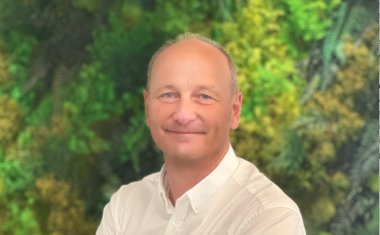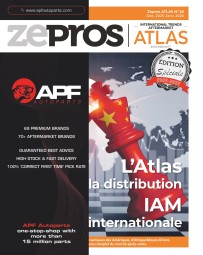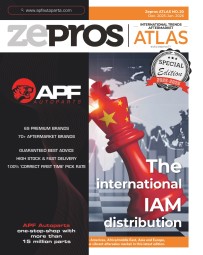
Spare parts players in active transformation

Optimising logistics, improving financial performance, engaging in sustainability: whatever their geographical area, the size of their business or their regulatory and competitive environment, distributors are taking a hard look at their KPIs (key performance indicators) and challenging themselves to address the transformations that will give them a more solid future.
“We can sense that there is a momentum building around business transformation, particularly in the aftermarket! A new global regulatory environment is taking shape, in particular accounting standards that include sustainability concepts which will ultimately affect all the players in the chain. Following in the footsteps of manufacturers and parts suppliers, the aftermarket is now joining this revolution”, explains Antoine Soulier, co-founder and managing director of Inteliam (see box), a rating solution specially designed for the aftermarket. “We’re talking to companies that are often well established and open to change, who are looking to the future aware of the need to measure where they’re starting from”, adds A. Soulier, whose firm draws up a list of distributors’ strengths and areas for improvement in the 50 countries audited.
The quest for profit
First observation: “This is an industry where the operators make money”, with profitable companies, whatever their geographical area or size. It should be noted that the standard deviation between distributor sizes is very high. The distribution network on all continents ranges from €1m in sales to €300m. “We find this everywhere: in South Africa, India and Western Europe, but also in Eastern Europe, but not in North Africa or Latin America.”
The second trend is that these aftermarket players are reluctant to sign up to ISO certification, whether they operate in a mature or developing country. Also, the implementation of a highly structural organisation, incorporating strategic schedules and risk management, varies greatly depending on the competitive environment. On the other hand, “business leaders are all aware of the need to measure their performance and anticipate their future”.
Retrouvez la version en Français : Les acteurs de la rechange en mutation active
Logistical approach
Third point: specialist expertise in areas such as warehousing and logistics, purchasing and sales policy. While companies with sales of less than €50m are less highly rated, medium-sized companies (between €50m and €100m) score close to those over €100m. Areas for improvement include inventory management and analysis tools, measuring customer satisfaction and the use of occupational safety indicators. The digital maturity of the companies is also worth noting, with 20% of those audited reporting a presence on online parts selling platforms.
Exploring a more eco-friendly approach
Finally, “sustainability” comes into play, but at different levels. The size of the company and the level of local regulation also impact the degree of engagement in the concept. The point of entry for all of them remains the use of parts from the circular economy, although this is still underdeveloped in emerging markets (excluding Latin America) and particularly in Africa, due to the lack of an organised supply chain.
The same difficulty applies to waste management, which varies greatly from one continent to another. The other key area remains the measurement of energy consumption (30% of those audited), regardless of geographical region. The recent surge in energy costs is no doubt a factor in this interest. As proof that the subject is beginning to cut through, 10% of the companies audited have begun to measure their carbon footprint, using the additional assessment module set up by Inteliam. This is a way of anticipating a measure that will in due course become standard for all companies.
Inteliam, supporting change
Founded in 2020, the rating agency is unique in that it is exclusively dedicated to evaluating global automotive aftermarket companies. While it bases its work on global standards such as ISO 9001 (organisational management) and ISO 26000 (corporate social responsibility), the auditor has adapted its criteria to the specific characteristics of the aftermarket. Process/organisation, financial measures, specialist expertise and sustainability are the four themes covered in a 70-item list.
The process provides a transparent diagnosis and snapshot of the company, highlighting its strengths and areas for improvement. Behind the project is Antoine Soulier, originally from the oil industry, who moved into the world of certification with the ambition of combining digital tools and the field of certification, applied to the spare parts distribution ecosystem. It enjoys the support of major parts suppliers as well as groups such as Nexus Automotive International. After three years in operation, Inteliam already boasts 150 audited companies in 50 countries on four continents.








